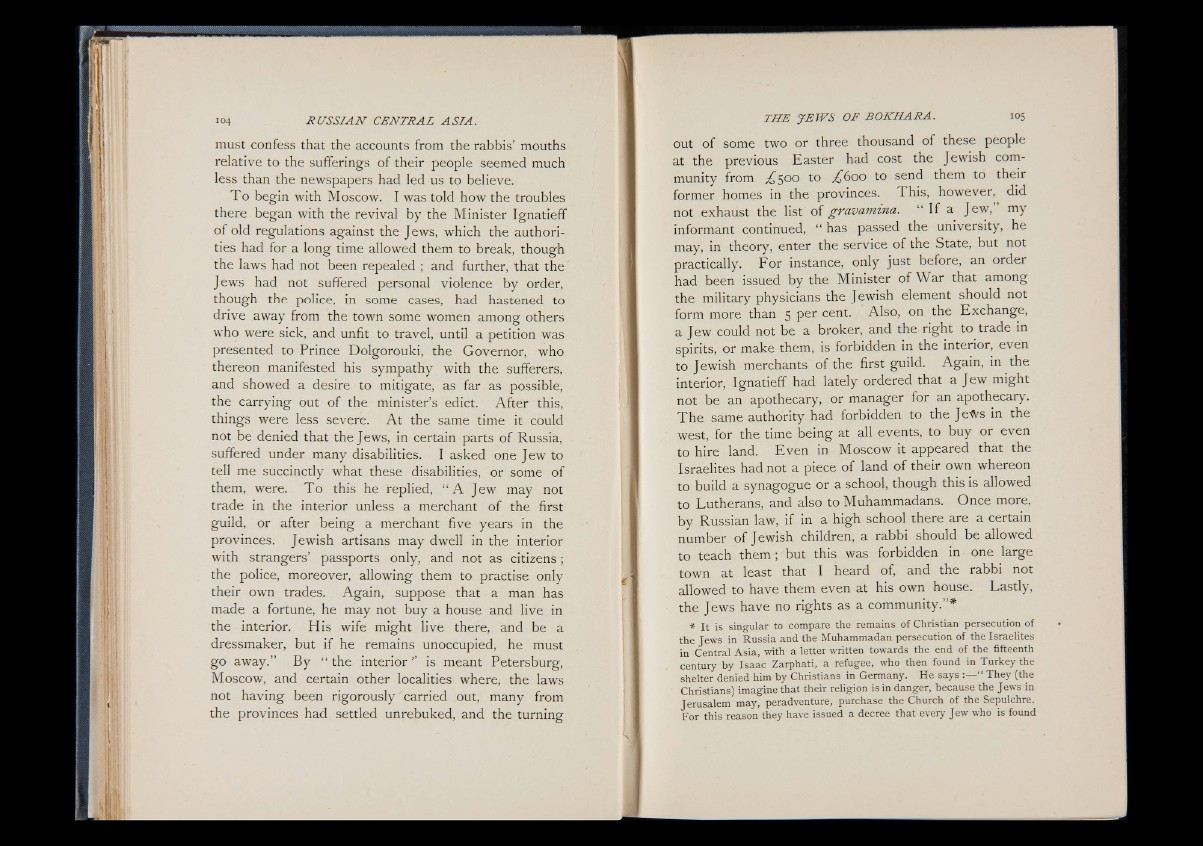
must confess that the accounts from the rabbis’ mouths
relative to the sufferings of their people seemed much
less than the newspapers had led us to believe.
T o begin with Moscow. I was told how the troubles
there began with the revival by the Minister Ignatieff
o f old regulations against the Jews, which the authorities
had for a long time allowed them to break, though
the laws had not been repealed ; and further, that the
Jews had not suffered personal violence by order,
though the police, in some cases, had hastened to
drive away from the town some women among others
who were sick, and unfit to travel, until a petition was
presented to Prince Dolgorouki, the Governor, who
thereon manifested his sympathy with the sufferers,
and showed a desire to mitigate, as far as possible,
the carrying out o f the minister’s edict. After this,
things were less severe. A t the same time it could
not be denied that the Jews, in certain parts of Russia,
suffered under many disabilities. I asked one Jew to
tell me succinctly what these disabilities, or some of
them, were. T o this he replied, “ A Jew may not
trade in the interior unless a merchant o f the first
guild, or after being a merchant five years in the
provinces. Jewish artisans may dwell in the interior
with strangers’ passports only, and not as citizens;
the police, moreover, allowing them to practise only
their own trades. Again, suppose that a man has
made a fortune, he may not buy a house and live in
the interior. His wife might live there, and be a
dressmaker, but if he remains unoccupied, he must
go away.” By “ the interior ” is meant Petersburg,
Moscow, and certain other localities where, the laws
not having been rigorously carried out, many from
the provinces had settled unrebuked, and the turning
out of some two or three thousand of these people
at the previous Easter had cost the Jewish community
from ^500 to ^600 to send them to their
former homes in the provinces. This, however, did
not exhaust the list of gravamina. “ If a Jew,” my
informant continued, “ has passed the university, he
may, in theory, enter the service of the State, but not
practically. For instance, only just before, an order
had been issued by the Minister of War that among
the military physicians the Jewish element should not
form more than 5 per cent. Also, on the Exchange,
a Jew could not be a broker, and the right to trade in
spirits, or make them, is forbidden in the interior, even
to Jewish merchants of the first guild. Again, in the
interior, Ignatieff had lately ordered that a Jew might
not be an apothecary, or manager for an apothecary.
T h e same authority had forbidden to the JeWs in the
west, for the time being at all events, to buy or even
to hire land. Even in Moscow it appeared that the
Israelites had not a piece of land o f their own whereon
to build a synagogue or a school, though this is allowed
to Lutherans, and also to Muhammadans. Once more,
by Russian law, if in a high school there are a certain
number of Jewish children, a rabbi should be allowed
to teach them; but this was forbidden in one large
town at least that I heard of, and the rabbi not
allowed to have them even at his own house. Lastly,
the Jews have no rights as a community.”*
* It is singular to compare the remains of Christian persecution of
the Jews in Russia and the Muhammadan persecution of the Israelites
in Central Asia, with a letter written towards the end of the fifteenth
century by Isaac Zarphati, a refugee, who then found in Turkey the
shelter denied him by Christians in Germany. He says :— “ They (the
Christians) imagine that their religion is in danger, because the Jews in
Jerusalem may, peradventure, purchase the Church of the Sepulchre.
For this reason they have issued a decree that every Jew who is found